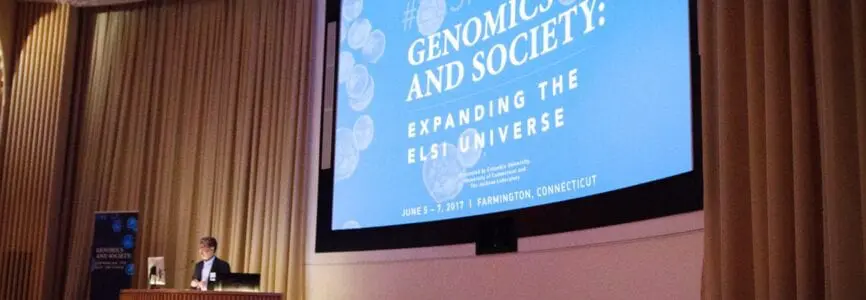Hastings Center News
Genome Sequencing of Newborns: How Can It Be Done Responsibly?
This was one of the many big questions explored at Genomics and Society, a major conference last week on the ethical, legal, and social implications of genomic research.
Several Hastings Center staff members and Fellows participated. Josephine Johnston, director of research, spoke on two panels. One of them discussed the likelihood that it will soon become common practice to genetically sequence newborns and asked what policies are needed to assure that it’s done responsibly. Another panel looked at genomic sequencing of fetuses, newborns, and children, considering the ethical arguments for enabling parents and prospective parents not only to choose whether to have testing, but which kinds of results to get back.
.@bioethicsjosie: genetic testing results in a lot of choice. What degree is important? What kind of data is analyzed/ returned? #ELSICON pic.twitter.com/a7VUNA93J1
— The Hastings Center (@hastingscenter) June 7, 2017
Research scholar Karen Maschke presented two posters. One of them demonstrated why medical research institutions should have an institutional governance framework for research with patients’ biospecimens and data. The other focused on concerns about using whole genome sequencing information for patient care at a time when the clinical utility of this information is unclear. Hastings Center research assistants and project managers Elizabeth Dietz and Rachel Zacharias presented a poster on a new National Institutes of Health policy that requires researchers to account for sex as a biological variable in basic research: how might the policy shape (or not) the research landscape and debates surrounding the sex and gender in research? Other speakers included many Hastings Center Fellows, including Paul Appelbaum and Barbara Koenig, and advisory council member James Evans.
Other topics of discussion included the role of genetics variations in population health disparities and controversies over the study of race in medicine.
https://twitter.com/DNAlawyer/status/872433956586651649
Burke nails it: none of us believes in genetic determinism, yet our discourse implies it #elsicon #bioethics
— Josephine Johnston (@bioethicsjosie) June 7, 2017
#ELSICON The biggest communication challenge of the modern era. How to communicate the magnitude of genomic information? pic.twitter.com/VWPDMDA1XY
— Megan Lewis (@megan_lewis586) June 7, 2017

